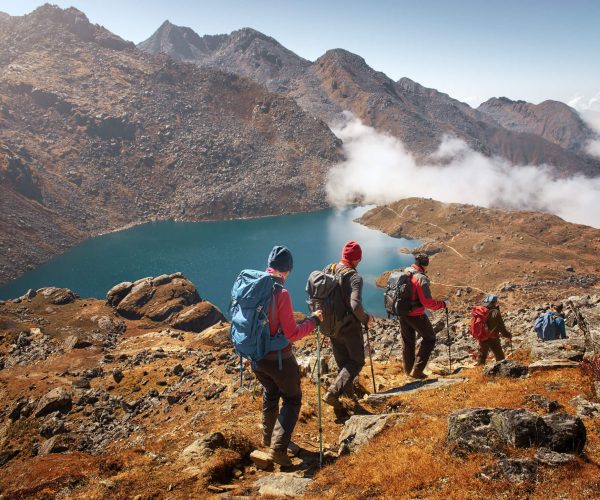Do you know which vaccinations you need before heading abroad for your next adventure? For those planning an action-packed trip this year – whether you’re trekking through the jungles of South America, diving in tropical waters, or scaling mountains in Asia, getting the right travel vaccinations is just as important as packing your gear.
Many adventure sports travellers focus on the physical and technical preparations for their trip but overlook the health risks of travelling to regions where diseases are prevalent. Without the proper vaccinations, you could be at risk of serious illnesses, hefty medical expenses. Activities that don’t pose much risk in the UK, like trekking, could become far more challenging in extreme environments abroad.
This guide aims to make you aware of the necessary travel vaccinations you might need for adventure sports activities, including potential risks, the most common countries requiring vaccinations, and general tips for staying safe abroad.
Why do you need travel vaccinations?
Travel vaccinations protect against diseases that are uncommon in the UK but prevalent abroad. Your immune system may not be prepared for viruses or bacteria found in foreign environments, which can lead to severe illnesses.
If you’re engaging in extreme sports or adventure activities, you may be at an even higher risk. Typically, activities such as jungle trekking, at high altitudes or in other more extreme environments can lead you away from amenities and medical services. It poses a greater risk of affliction for scenarios like these:
Exposure to contaminated water
Waterborne diseases are a major concern in many travel destinations, especially in regions with poor sanitation and untreated water sources. Drinking or swimming in contaminated water can expose you to serious infections like Hepatitis A and Typhoid.
Insect bites
Mosquitoes and other insects are primary carriers of serious tropical diseases, including Malaria, Yellow Fever, Dengue Fever, and Japanese Encephalitis. In some regions, these diseases are widespread, and without proper precautions, you could be at risk.
Animal contact
Encountering animals abroad, whether stray dogs, monkeys, or bats, may seem exciting, but it comes with serious health risks, particularly Rabies. Rabies is almost always fatal once symptoms appear, making prevention essential.
Remote locations with limited medical care
If you’re trekking in the Himalayas, exploring deep jungles, or venturing into isolated deserts, medical help may be hours, or even days, away. Getting ill or injured in a remote area can become a serious issue if you don’t have access to proper treatment.
Injuries in unsanitary environments
Extreme sports and outdoor adventures increase the risk of cuts, scrapes, and open wounds, which can become infected in dirty or unsanitary conditions. Tetanus, a bacterial infection found in soil, dust, and animal faeces, is a major concern.
What can happen if you don't get vaccinated?

Whilst it’s not necessarily a mandatory requirement to be fully vaccinated when you travel, it is sensible to make yourself aware of the potential risk if you don’t as well as what you can do to avoid exposure to these dangers.
1. Health Risks
Neglecting vaccinations can leave you vulnerable to severe illnesses, such as:
- Hepatitis A & B – Spread through contaminated food and water or contact with infected individuals.
- Typhoid – A serious bacterial infection found in regions with poor sanitation.
- Rabies – A deadly virus transmitted through animal bites or scratches.
- Yellow Fever – Spread by mosquitoes in tropical and subtropical regions.
- Japanese Encephalitis – A mosquito-borne disease found in rural Asia.
2. Financial Consequences
Medical care abroad can be shockingly expensive, with private hospitals often demanding upfront payments before providing treatment. If you face a situation whereby you need medical evacuation, treatment and potentially repatriation costs could venture into the 10s of thousands. Without comprehensive sports travel insurance, these costs could leave you stranded.
3. Travel Restrictions
Some countries won’t allow entry without proof of specific vaccinations. For example:
- Yellow Fever vaccination is mandatory for travellers entering certain African and South American countries. You can find out from the Travel Health Pro, if this is relevant to the country you’re travelling to and you might have to show a certificate for proof of vaccination.
For up-to-date vaccination requirements, you can check NHS Fit for Travel.
4. UK booster vaccines matter too
Even in the UK, vaccines like Tetanus should be kept up to date. A simple cut from an accident abroad could expose you to the bacteria, leading to a serious infection, that might impact your travel and consequently travel costs.
The Top 10 Countries that require travel vaccinations for UK visitors
Here are some of the most popular adventure travel destinations and their recommended vaccinations:
Country
| Required/Recommended Vaccinations
|
Thailand
| Hepatitis A & B, Typhoid, Rabies (for rural trekking)
|
India
| Typhoid, Hepatitis A & B, Rabies, Japanese Encephalitis
|
Brazil
| Yellow Fever, Hepatitis A & B, Rabies
|
Peru
| Yellow Fever, Hepatitis A, Typhoid, Rabies
|
South Africa
| Hepatitis A & B, Typhoid, Rabies
|
Indonesia (Bali)
| Hepatitis A & B, Typhoid, Rabies, Japanese Encephalitis
|
Kenya
| Yellow Fever, Hepatitis A & B, Typhoid, Rabies
|
Mexico
| Hepatitis A & B, Typhoid, Rabies
|
Vietnam
| Hepatitis A, Typhoid, Rabies, Japanese Encephalitis
|
Nepal
| Hepatitis A, Typhoid, Rabies, Japanese Encephalitis
|
(It’s always recommended to check with a travel clinic before departure as requirements may change.)
Special considerations for sports & adventure travellers
Trekking & hiking
Remote areas often have stray dogs, monkeys, and bats, increasing the risk of Rabies. If bitten, immediate medical treatment is needed, but rural areas may lack proper healthcare facilities.
Water sports & swimming
Lakes and rivers in some countries may be contaminated with Hepatitis A and Leptospirosis—a bacterial infection spread through animal urine. Avoid swallowing water while swimming and always shower after.
Extreme sports (Skydiving, Climbing, Biking, etc.)
Injury risks are high, and open wounds can be exposed to Tetanus bacteria in soil and dust. A booster dose is recommended if you haven’t had one in the past 10 years.
Jungle & rural travel
Mosquitoes thrive in these areas, transmitting Malaria, Dengue Fever, and Yellow Fever. Use insect repellent, wear long sleeves, and sleep under mosquito nets.
How to get your travel vaccinations in the UK
- Visit a Travel Health Clinic (NHS or Private) – Ideally, 6-8 weeks before departure.
Some vaccines are free on the NHS, including Hepatitis A, Typhoid, and Tetanus. - Other vaccines (Rabies, Yellow Fever, Japanese Encephalitis) must be paid for privately.
- Check for boosters – Some vaccines require multiple doses for long-term protection.
For more details, visit NHS Travel Vaccinations.
Extra travel health tips for sports travellers

Vaccinations are a vital part of travel health, but they don’t cover every disease. Taking extra precautions can help you avoid serious illnesses while abroad, particularly in adventure and extreme sports destinations.
Take malaria tablets if required
Malaria is a life-threatening disease spread by mosquitoes in certain parts of Africa, Asia, and South America. Unlike some illnesses, there is no vaccine for malaria, but you can take preventive medication (antimalarials).
- Check if your destination is a malaria-risk area (e.g., parts of Kenya, India, Thailand, and Peru).
- Different malaria tablets are available, your doctor will recommend the best option. Tablets must be taken before, during, and after your trip to ensure full protection.
- Use mosquito repellent, wear long sleeves, and sleep under a mosquito net to reduce the risk further.
Prevent mosquito-borne diseases
Aside from malaria, mosquitoes spread Dengue Fever, Zika Virus, and Japanese Encephalitis. Since there are limited vaccines for these diseases, avoid mosquito bites as much as possible by:
- Applying DEET-based insect repellent (at least 50% DEET).
- Wearing long-sleeved clothing and trousers, especially in jungle or rural areas.
- Using mosquito nets at night, particularly in high-risk regions.
Be careful with food and water
Many travel-related illnesses like Typhoid, Hepatitis A, and Traveller’s Diarrhoea are caused by contaminated food and water. To avoid getting sick:
- Drink bottled or purified water – avoid tap water, ice, and drinks made with untreated water.
- Eat freshly cooked, hot meals – avoid undercooked or raw foods (especially meat and seafood).
- Be aware of food preparation areas, it’s usually a safer bet to head to places popular with locals. Street food vendors can be better than some restaurants.
Protect against sun and heat-related illnesses
Adventure travellers spending long hours outdoors should take precautions against heatstroke, dehydration, and sunburn:
- Wear high-SPF sunscreen to prevent sunburn and reduce skin cancer risk.
- Stay hydrated – drink plenty of water, especially when trekking or doing physical activities.
- Avoid excessive alcohol and caffeine, as they contribute to dehydration.
- Acclimatise gradually to hot climates, especially if engaging in strenuous activities.
Avoid animal bites and scratches
Rabies is present in many countries, including Thailand, India, Indonesia, and South America. The virus is transmitted through the bite or scratch of an infected animal (e.g. dogs, monkeys, bats).
- Avoid touching stray animals, no matter how friendly they appear.
- Get a rabies pre-exposure vaccine if travelling to remote areas.
- If bitten, wash the wound immediately and seek medical attention ASAP.
Pack a personal first aid kit
Carrying a basic first aid kit can help you treat minor injuries, cuts, and infections before they become serious. Consider including:
- Antiseptic wipes & hand sanitiser
- Plasters & bandages
- Oral rehydration salts (for dehydration)
- Painkillers (Ibuprofen or Paracetamol)
- Anti-diarrhoea medication (Loperamide)
- Motion sickness tablets (if needed)
Before you pack your bags for an adventure, make sure your vaccinations are up to date. Preventative health care is an essential part of travel preparation—protecting you from illnesses that could disrupt your trip or leave you with expensive medical bills.
Book an appointment with a travel clinic well in advance and check official guidelines before departure.
Get Specialist Sports Travel Insurance with SportsCover Direct
Making sure you have all your travel vaccinations up to date is an essential stage in planning your trip and ensuring you are fully prepared for what you might encounter. When situations occur that are beyond your control and you need to make use of services such as search and rescue, medical care and repatriation it’s critical you have a specialist sports travel insurance that caters for the activities you’re doing.
SportsCover Direct covers over 500 sports and activities and specialises in the extra cover you might need when doing something more specialist or extreme.
Our Sports Travel Insurance gives you worldwide cover and is designed to give financial protection for medical and repatriation costs, cancelled trips and more. You can also opt for a bolt-on, Activity Top-Up, to add to your existing policy for specialist activities.
Find out more and get a personalised quote online.
This blog has been created as general information and should not be taken as advice. Make sure you have the correct level of insurance for your requirements and always review policy documentation.